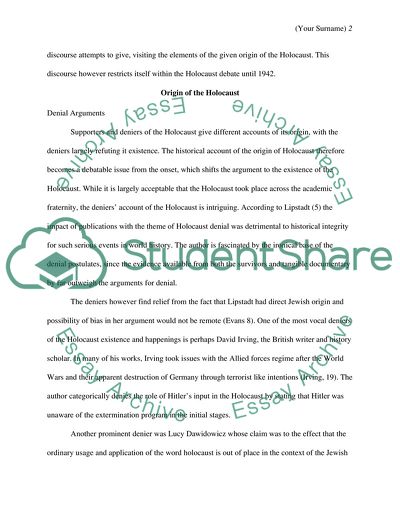Cite this document
(The Origin of Holocaust Literature review Example | Topics and Well Written Essays - 3000 words, n.d.)
The Origin of Holocaust Literature review Example | Topics and Well Written Essays - 3000 words. Retrieved from https://studentshare.org/history/1750581-outline-and-account-for-the-main-elements-of-the-historians-debate-about-the-origins-of-the-holocaust-concentrating-on-the-period-up-to-january-1942
The Origin of Holocaust Literature review Example | Topics and Well Written Essays - 3000 words. Retrieved from https://studentshare.org/history/1750581-outline-and-account-for-the-main-elements-of-the-historians-debate-about-the-origins-of-the-holocaust-concentrating-on-the-period-up-to-january-1942
(The Origin of Holocaust Literature Review Example | Topics and Well Written Essays - 3000 Words)
The Origin of Holocaust Literature Review Example | Topics and Well Written Essays - 3000 Words. https://studentshare.org/history/1750581-outline-and-account-for-the-main-elements-of-the-historians-debate-about-the-origins-of-the-holocaust-concentrating-on-the-period-up-to-january-1942.
The Origin of Holocaust Literature Review Example | Topics and Well Written Essays - 3000 Words. https://studentshare.org/history/1750581-outline-and-account-for-the-main-elements-of-the-historians-debate-about-the-origins-of-the-holocaust-concentrating-on-the-period-up-to-january-1942.
“The Origin of Holocaust Literature Review Example | Topics and Well Written Essays - 3000 Words”, n.d. https://studentshare.org/history/1750581-outline-and-account-for-the-main-elements-of-the-historians-debate-about-the-origins-of-the-holocaust-concentrating-on-the-period-up-to-january-1942.


